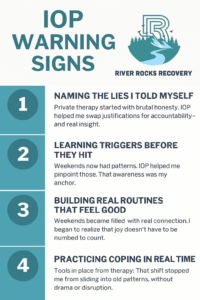I used to pride myself on being in control. Monday through Thursday, I was high-functioning—on time, efficient, even optimistic. Then Friday rolled around, and I’d plan a “harmless weekend” bender. By Sunday evening, I was shattered—and stuck in the same cycle. I thought I didn’t need treatment. Treatment was for people with wrecked lives, right? Not for me. But I was wrong. What changed? I found IOP—and it changed everything.
Recognizing the Pattern: When Weekends Own Your Life
At first, it wasn’t that big a deal. A drink here. A drink there. But every weekend, suddenly, I couldn’t stop. I convinced myself it was just stress relief—but by Monday morning, I was making apologies. Or worse, I skipped Monday altogether.
The real problem? My weekends weren’t just days off—they dictated my whole week. Weekdays became about recovery, not living. And the clock would just reset again come Friday.
If this sounds familiar—Sunday dread, Monday fog—the cycle isn’t harmless. It’s a slow-motion crash. But IOP gave me the tools to stop that crash before it started.
Why IOP Makes Sense for Weekend Bingers
Treatment didn’t need to be all or nothing. I had a demanding job, bills, family plans. IOP was the middle path I didn’t know existed.
- It fit in: several weekly sessions that didn’t force me to check out of life.
- It built awareness: helping me see patterns before they ran my life.
- It gave context: real help from people who get the “weekend warrior” mindset.
At River Rocks Recovery’s IOP in Middletown, Ohio, I found a program that respected my responsibilities—and gave me space to fix the weekend part of my life. The Intensive Outpatient Program in Middletown, Ohio was exactly what I needed to regain balance without stepping away from everything else.
Step-by-Step: How IOP Broke My Weekend Pattern
1. Naming the Lies I Told Myself
Private therapy started with brutal honesty. I lied: “I can manage it.” I planned it. I justified it. I even looked forward to it. I had to face that there was nothing “harmless” about my weekends anymore.
IOP helped me swap justifications for accountability—and real insight.
2. Learning Triggers Before They Hit
Weekends now had patterns. Financial stress. Work hassles. Feeling isolated. IOP helped me pinpoint those. We used role-playing, journaling, and peer sharing to surface what I was avoiding—and what I was fearing. That awareness was my anchor.
3. Building Real Routines That Feel Good
IOP didn’t just stop me from drinking—it gave me something to do instead. Weekends became filled with real connection: trail runs, game nights, solo projects that felt meaningful. I began to realize that joy doesn’t have to be numbed to count.
4. Practicing Coping in Real Time
When cravings hit Friday evening, I had tools in place from therapy: breathing, text support, escape plans, emergency calls. No more denying. No more planning. Just responding—with a plan. That shift stopped me from sliding into old patterns, without drama or disruption.

What IOP Looked Like in My Actual Life
Here’s how my week unfolded after starting IOP:
- Morning (during session days): I showed up clearer—no dread, just intention.
- Afternoon: I handled stress at work with tools, not temptation.
- Evening: I had space to process triggers, talk with peers, or ground myself at home.
Even on non-session days, the work continued—journaling, check-ins, breathing exercises, community stories. I started feeling like being sober was just another version of living—not a punishment.
Why IOP Didn’t Require Losing My Life—Just Remodeling It
I worried treatment meant uprooting. But IOP wasn’t demolition—it was renovation. I didn’t close my accounts or change my address. I just rewired my habits—kept the same floors, but added stronger beams.
Some metaphorical plumbing needed fixing. Some old wiring needed rewiring. But the house was solid.
The Unexpected Benefits of Quitting the Benders
- Self-respect returned
I don’t lie to myself anymore. Monday mornings don’t feel like confessions. - Relationships deepened
People noticed. Not because I yelled less—but because I showed up more. Present. Curious. Unexpected. - Creativity came back
Quiet mornings without hangovers felt like blank pages again. - Confidence grew
Not from achievement, but from consistency. From choosing myself again.
FAQs About IOP for Weekend Benders
1. I only binge on weekends—is IOP really worth it?
Yes. Even one binge a week takes a toll. IOP helps you break the pattern before it escalates.
2. Will treatment mess with my job or life?
Not with River Rocks Recovery. They offer flexible schedules so you can keep your responsibilities and still attend sessions.
3. What happens if I slip up?
Then you speak up. In IOP, relapse isn’t failure—it’s data. Your team helps you learn, adjust, and move forward.
4. How long is IOP?
Typically 8–12 weeks, but personalized. You stay as long as you need to build your new habits.
5. Do I have to be super vulnerable?
Share what makes you comfortable. Honest listening matters as much as talking. People learn just by showing up.
6. Do I need to move to Middletown for IOP?
No. River Rocks supports folks in Middletown and nearby Hamilton, Ohio, so you don’t have to disrupt your life to get help.
Your Weekend Doesn’t Define You—Until It Does
If you dread Sunday night, or you lose a day—or two—every weekend, you’re telling yourself something meaningful. Those patterns matter. They signal something deserves attention. You don’t need to wait until you crash to get help. You just need to choose a different path before the cycle consumes you.
Ready to make your weekends peaceful, not destructive?
Call (888) 905-6281 to learn more about IOP services in Middletown, Ohio.




























